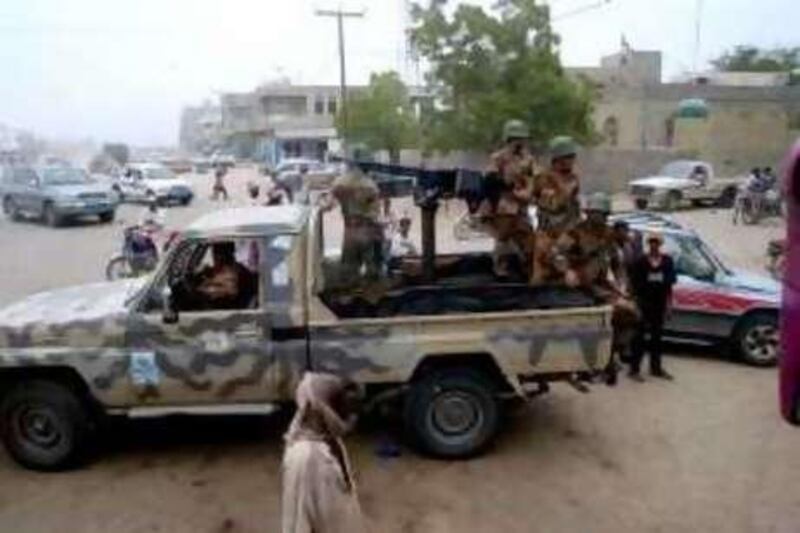SANA'A // Political analysts are concerned that the latest peace agreement between the government and al Houthi rebels in the northern province of Sa'ada cannot be sustained despite an announcement this month by the president that the long-running conflict was over. "Dialogue is the civilised way and is better than bloodshed," Ali Abdullah Saleh, the president, said in a brief speech carried by state television on July 17 to announce the end of a conflict that has claimed thousands of civilian lives and more than 700 military personnel since 2004.
"This is not the first time the president has announced the end of the conflict. I do not question the credibility of the decision, but its ability to be implemented on the ground," said Mohammed al Sabri, a political analyst. "It is surprising and adventurous and nobody knows about the content of the agreement except [that] the decision to end the war came after a phone call with rebel leader Abdulmalik al Houthi and mediation of some tribal leaders," he said.
A ceasefire agreement was signed in February in Doha, the Qatari capital, but broke down almost immediately. And despite Mr Saleh's announcement of the war's end, skirmishes were reported in some parts of Sa'ada, 290km north-west of the Yemeni capital, Sana'a, and Harf Sefyan last weekend. Independent verification of the clashes are impossible because of the lack of communications - including cellphones - in the area.
Houthi's office has denied government accusations the rebels broke the ceasefire by blowing up mosques. In turn, it accused the government of breaching the ceasefire in some parts but did not specify when or how. "These ceasefire breaches conflict with the seriousness of the authorities in [finding] a peaceful solution and our agreements to sort out differences via dialogue," a statement by the rebels said. However, it said, military troops had withdrawn from northern districts, including Maran and Khawlan.
Security forces and cars were seen yesterday patrolling the streets of Sana'a and searching people in the streets. Abdulqader Hilal, the minister of local administration, described Mr Saleh's decision to withdraw from the area as "brave, reflecting concern of the political leadership to preserve blood and attain stability, security and peace in Sa'ada". The fighting had displaced about 120,000 people since last year; 15,000 were forced to flee their homes in the latest bout of fighting in May, according to the Yemen Red Crescent Society. Mr Hilal said 70 per cent of those displaced had returned to their homes since Mr Saleh made his announcement. Mr Hilal, who is heading a field committee assessing damage and reconstruction needs, said on Saturday the primary concern of the government was to rebuild the area.
"The battle of development is no less important than achieving security and stability. Our committee has a humanitarian task including the return of the displaced people and we will not leave the area until we make sure services to the institutions damaged by the war are operating again. We have also started assessing the damage scale and construction needs," he said. Mr Sabri, the analyst, said that for the peace settlement to work, all elements involved in the fighting must be on board.
"The drag on of the war ? has encouraged regional forces like Iran and Saudi Arabia to interfere. Therefore, any settlement will not have the potential to sustain unless these forces are involved in the peace process. Otherwise the truce remains fragile and if confrontation flares up again, the scale of fight will be bigger and might go beyond Sa'ada to include other parts of the country," he said.
Mr Saleh has insisted the rebels no longer have regional backing. In 2007, the government claimed Iran and Libya were supporting al Houthi. Influential tribal leaders are another important element that, according to Mr Sabri, must be included in any settlement. This month, Mr Saleh met various tribal leaders with a view to forming a "popular army" of 27,000 tribesmen against al Houthi. Sheikhs of the Hashid, Yemen's biggest tribe, were mobilising tribesmen to support government troops. Tribesmen and Salafi Sunnis fought against the rebels last year.
"I believe the two warring sides realised the fruitlessness of the fight. However, there are groups that have interests in the continuation of the war - mainly some tribal leaders - and as long as the tribe has a big influence in the state, these tribal figures will do their best to ensure war flares up again," said Mohammed al Ghobari, a political analyst. Sheikh Hussein al Ahmer, president of the tribal-based National Solidarity Council, said Mr Saleh would be responsible for the consequences of ending the war.
"If such a decision will end the rebellion and al Houthis will step down from mountains and give in their arms and respect law and order, that is fine. But, if it is just a two- or three-month truce, then the person who took the decision to stop the war should be responsible for any consequences," he said during a solidarity council conference that kicked off in Sana'a yesterday with the participation of tribal sheikhs from different parts of the country.
Sheikh Ahmer, however, said he expected the war to break out again, probably after parliamentary elections scheduled for April. Fighting erupted after the presidential elections in 2006. Qatar stepped in last year to broker a peace deal and a truce was signed in July 2007, but that came under pressure soon after as the rebels were reluctant to give up their weapons. Talks broke down in November and before long skirmishes broke out between the rebels and the government. The two sides agreed in February to revisit the peace deal, but it again came under strain leading to renewed fighting.
@Email:malqadhi@thenational.ae





